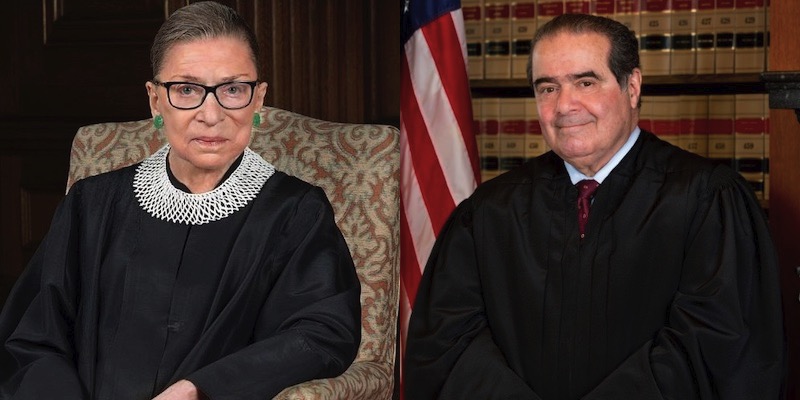The late Justice Ruth Bader Ginsburg was honored on a postage stamp from the U.S. Postal Service. Ginsburg, who passed away in 2020, was considered a pioneer on the Supreme Court and led the liberal charge in nearly every case that came before the court.
It’s Merely a Postage Stamp
The stamp became available for use in mid-October and reveals Ruth Bader Ginsburg adorned by the black judge’s robe and signature white collar. Most people don’t have qualms about this particular honor. After all, it is simply a postage stamp. Ginsburg was only the second woman to be on the Supreme Court, following Justice Sandra Day O’Connor.
The question arises, who else merits being honored in this way via the U.S. Postal Service? The main criterion is to have been a justice of some kind of distinction and, of course, to be deceased. So, who meets the criterion, but thus far has not been so posthumously honored?
William Rehnquist, serving as Chief Justice on the court from 1986 to 2005, certainly had a significant impact. Rehnquist triumphed as Chief Justice and displayed uncanny leadership and pragmatic skills. His calm and even temperament aided his efforts when seeking a majority opinion. The liberal justices on the court acknowledged Rehnquist’s evenhandedness in dealing with opposing viewpoints.
Best of Friends, Politics Aside
Representing conservative views, as she was representing liberal views, Justice Antonin Scalia was as prominent on the court as Ruth Bader Ginsburg. Because of his outgoing personality, more people are familiar with him. Away from the court, Scalia and Ginsburg were great friends.
They often vacationed together with their spouses, to the astonishment of many people, who felt that the wedge between left and right had grown so wide that one could not maintain such friendships. Nevertheless, they did. Scalia died in 2016, four years before Ginsberg, but has yet to be posthumously honored on a postage stamp.
Other justices throughout history, up to more recent times, similarly have not been honored in this way. So, who is honored via the U.S. Postal Service and why?
One would presume that such an honor is completely bipartisan and not only liberal chief justices and justices would be considered for the honor. That presumption is quite wrong.
No End to Partisan Ship
It is time, not only via the U.S. Postal Service, but in so many other government agencies — more than 500 of them, including the minor ones — that partisanship ends. This is the United States of America, a representative republic, where voices along a broad political spectrum have a right to be heard.
Should such voices proceed to a position of prominence and distinction, they ought to attain the kinds of honors that our government and culture has to bestow. To present awards and honors in only one direction is anathema to the founding of our country, how we have progressed, and where we are headed.
To ignore roughly half of the country and the leaders of that half of the country because an agency and select committees within an agency decide that political viewpoints are more important than brilliance and contributions is to commit a grave error. Such actions are a disservice to all Americans of all political persuasions.
The Progressive Award Industry
A variety of other honors and distinctions routinely go to those on the Left while ignoring those on the Right. The Pulitzer Prize, for example, routinely rewards those on the Left. For a conservative to win that prize, one would have to make a contribution that is beyond extraordinary. Likewise, with notable exceptions such as Jon Voight, Denzel Washington, and Clint Eastwood, Academy Awards (Oscars) accrue to those on the Left.
Internationally, it has been well documented that the vast majority of Nobel Peace Prize winners lean left, going back several decades. Why? The awards committee members for the Nobel Prize Lean heavily left.
By any objective measure, President Trump should have received the Nobel Peace Prize for brokering the peace between Israel and the United Arab Emirates, Israel, and Sudan, and Israel and Morocco. He was nominated, but you can hold your breath from now until the end of time, and the Nobel Peace Prize committee will never give him the award.
Alfred Nobel left $250 million in his will to fund the prize. Issuing awards only in one political direction cheapens the honor and besmirches his intentions.




